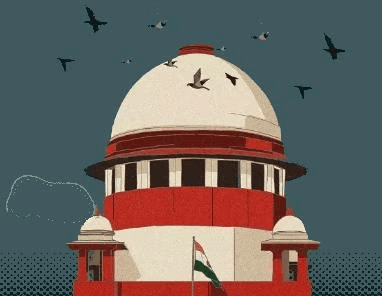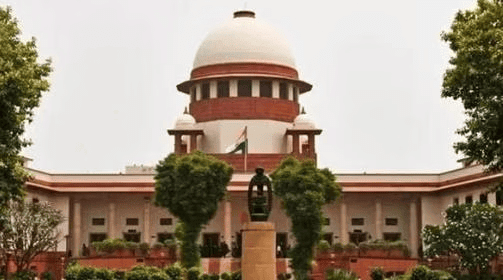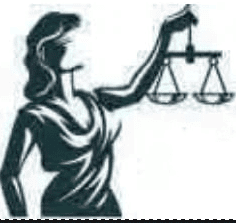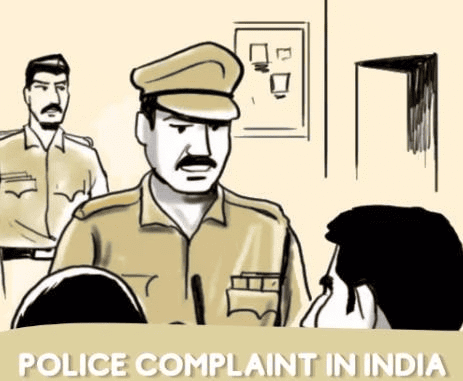Legal Current Affairs for CLAT (April 2024) | Legal Reasoning for CLAT PDF Download
Article 20(3) of the COI

Why in News?
Recently, the Supreme Court, in the case of Smt. Najmunisha, Abdul Hamid Chandmiya alias Ladoo Bapu v. State of Gujarat, Narcotics Control Bureau, ruled that Article 20(3) of the Constitution of India, 1950 (COI) remains unaffected by the provisions of search and seizure under the Narcotic Drugs and Psychotropic Substances Act, 1985 (NDPS Act).
Background of the Smt. Najmunisha, Abdul Hamid Chandmiya alias Ladoo Bapu v. State of Gujarat, Narcotics Control Bureau Case:
- In this case, Smt. Najmunisha (Accused No. 01) was initially convicted under the provisions of the NDPS Act. The Trial Court had sentenced her to ten years of rigorous imprisonment and a fine of Rs. 30,000.
- The High Court of Gujarat later modified this sentence, partly allowing her appeal, enhancing the fine to the minimum prescribed amount of INR 1,00,000 and reducing the sentence in default of paying the fine from one year of simple imprisonment to three months.
- Abdul Hamid Chandmiya alias Ladoo Bapu (Accused No. 04), the husband of Accused No. 01, was convicted under the NDPS Act and sentenced to thirteen years of rigorous imprisonment and a fine of Rs. 1,00,000. The High Court of Gujarat affirmed his conviction and dismissed his appeal.
- The present criminal appeals were filed before the Supreme Court, challenging the common judgment of the Division Bench of the Gujarat High Court in the appeals moved by Original Accused No. 01 and Accused No. 04.
- The Supreme Court allowed the appeals, setting aside the impugned judgment of both the High Court and the Trial Court.
Court’s Observations:
- A bench comprising Justices Aniruddha Bose and Augustine George Masih observed that in this case, the primary concern is the jurisprudence of the NDPS Act, which involves the power of search and seizure conferred by the State on its executive or administrative arms to ensure social security in a civilized nation.
- It was further noted that such power is inherently limited by the recognition of fundamental rights enshrined in the Constitution, as well as by statutory limitations. At the same time, it was emphasized that the provisions for search and seizure under the NDPS Act do not affect the protection granted by Article 20(3) of the COI. Therefore, such power cannot be considered a violation of the fundamental rights of the person concerned.
What is Article 20(3) of the COI?
- Article 20 deals with protection in respect of conviction for offences.
- Article 20(3) affirms that no person accused of any offence shall be compelled to be a witness against himself.
- This right provides the accused with the privilege to remain silent during a trial or investigation, with the State having no claim to any confession made by the accused.
Case Laws:
- In the case of Maneka Gandhi v. Union of India (1978), the Supreme Court stated that the process of justice must be fair and based on equitable grounds.
- In Selvi v. State of Karnataka (2010), the Supreme Court held that Article 20(3) of the COI holds an exalted status. This provision is an essential safeguard in criminal procedures and is meant to protect against torture and other coercive methods used by investigating authorities.
Right To Be Free from Adverse Effects of Climate Change

Why in the News?
Recently, the Supreme Court observed that "The right to equality under Article 14 and the right to life under Article 21 must be appreciated in the context of the decisions of this Court, the actions and commitments of the state on the national and international level, and scientific consensus on climate change and its adverse effects. From these, it emerges that there is a right to be free from the adverse effects of climate change."
This observation was made in the case of MK Ranjitsinh and Ors. v. Union of India and Ors.
Background of MK Ranjitsinh and Ors. v. Union of India and Ors. Case:
- The case involves the critical endangerment of the Great Indian Bustard (GIB), a species native to India, primarily found in Rajasthan.
- The population of GIB has rapidly declined due to habitat loss, hunting, and other threats.
- Several conservation efforts have been initiated, including the installation of bird diverters and breeding programs.
- However, challenges persist, particularly the danger posed by overhead transmission lines to the species.
- A writ petition was filed seeking urgent conservation measures, which led to court directives to convert existing overhead power lines into underground ones.
- The government raised concerns about the feasibility and implications of such directives, especially in the context of commitments to renewable energy and climate change mitigation.
Court's Observations:
- The Supreme Court held that “India faces a number of pressing near-term challenges that directly impact the right to a healthy environment, particularly for vulnerable and indigenous communities, including forest dwellers. The lack of reliable electricity supply for many citizens not only hinders economic development but also disproportionately affects communities, including women and low-income households, further perpetuating inequalities.”
- Therefore, the right to a healthy environment includes the principle that every individual is entitled to live in an environment that is clean, safe, and conducive to their well-being.
- The Court also emphasized that by recognizing the right to a healthy environment and the right to be free from the adverse effects of climate change, states are obligated to prioritize environmental protection and sustainable development. This, in turn, addresses the root causes of climate change and safeguards the well-being of present and future generations.
What is Article 14?
- Article 14 of the Constitution of India, 1950 affirms the fundamental right of “equality before the law” and “equal protection of the law” to all persons.
- The first expression, “equality before law,” is of English origin, while the second expression, “equal protection of law,” has been taken from the American Constitution.
- Article 14: Equality before the law - "The State shall not deny to any person equality before the law or the equal protection of the laws within the territory of India."
Rights of Persons with Disabilities Act, 2016

Why in News?
Recently, the Supreme Court ruled that denying child-care leave to mothers of children with disabilities violates the Constitutional duty to ensure equal participation of women in the workforce.
Background of the Case
- The petitioner is an assistant professor at a college in Nalagarh, Himachal Pradesh.
- She approached the State government seeking child-care leave, as her son suffers from Osteogenesis Imperfecta, a rare genetic disorder, and has undergone multiple surgeries.
- Due to his ongoing treatment, she had exhausted all her available leave. However, her application for child-care leave was rejected because the provision was not adopted.
- The woman then approached the Himachal Pradesh High Court, which dismissed her plea.
- Subsequently, she filed an appeal in the Supreme Court.
- The Supreme Court allowed the appeal and directed the Himachal Pradesh State Government to revise its child-care leave policy to align with the provisions of the Rights of Persons with Disabilities Act, 2016.
Court’s Observations
- The Bench, consisting of Chief Justice of India (CJI) DY Chandrachud and Justice JB Pardiwala, emphasized that child-care leave serves an essential constitutional purpose of ensuring that women are not denied equal opportunities in the workforce. Denying such leave could force a mother to leave her job, particularly one who has a child with special needs.
- The Court further held that women's participation in the workforce is not merely a privilege but a constitutional right protected under Article 15 of the Constitution of India, 1950 (COI). The State, as a model employer, cannot overlook the special concerns of women in the workforce.
Relevant Legal Provisions Involved
Rights of Persons with Disabilities Act, 2016
- Enacted on 27th December 2016, replacing the Persons with Disabilities (Equal Opportunities, Protection of Rights and Full Participation) Act, 1995.
- The Act came into force on 19th April 2017, marking a significant shift in the recognition and rights of persons with disabilities (PWDs) in India.
- It expands the scope of disabilities to include 21 conditions, covering physical, intellectual, mental, and sensory impairments.
- The Act mandates that educational institutions and government bodies reserve seats and positions for persons with disabilities to ensure their access to education and employment.
- It stresses the creation of barrier-free environments in public spaces, transportation, and information technologies to improve accessibility for PWDs.
- The Act requires the government to develop schemes for social security, healthcare, and rehabilitation of persons with disabilities.
- It also mandates guidelines for public buildings to ensure universal accessibility.
Article 15 of the COI
- This article prohibits discrimination on the basis of religion, race, caste, sex, or place of birth.
- It states that no citizen shall be discriminated against on these grounds alone.
- The article includes exceptions, allowing for provisions to be made for the upliftment of women, children, and citizens from socially or educationally backward classes (e.g., reservations, free education).
Insisting on Police Complaint

Why in News?
Recently, the Bombay High Court, in the matter of XYZ v. State of Maharashtra & Ors., held that a hospital cannot deny medical treatment to a pregnant minor girl merely because no police complaint has been filed in the matter.
Background of XYZ v. State of Maharashtra & Ors. Case
- A writ petition was filed before the Bombay High Court by a petitioner to protect the legal rights and health interests of her daughter, who is 17 years and 4 months old.
- The petition stated that the petitioner had recently learned that her daughter was about seven months pregnant.
- The daughter refused to disclose any details, stating that her relationship with the concerned person, also a minor, was consensual.
- Both the daughter and the petitioner did not intend to take legal action against the person involved in the relationship.
- The petitioner's grievance was that whenever she sought medical treatment for her daughter at various clinics or hospitals, she was asked to provide a police complaint as a prerequisite.
- In its judgment, the High Court ruled that medical treatment would be provided to the petitioner’s daughter, either independently or through a special method, with confidentiality maintained, including not revealing her name. The hospital was directed to provide all necessary medical care until the child was born.
Court’s Observations
- A Division Bench consisting of Justices GS Kulkarni and Firdosh Pooniwalla observed that there cannot be any insistence from medical centers or hospitals that the petitioner must first file a police complaint as a condition to receiving medical treatment.
- The court emphasized that the absence of a police complaint cannot be a reason to deny medical aid to the petitioner’s daughter.
- The court further affirmed that the right to medical aid is directly connected to Article 21 of the Constitution of India, 1950, which guarantees the right to life and personal liberty, including access to necessary healthcare.
- The court stated that in a civilized society, no person can be deprived of medical treatment, especially in the circumstances presented in this case.
What is Article 21 of the Constitution of India?
- Article 21 protects life and personal liberty. It stipulates that no person shall be deprived of their life or personal liberty except according to a procedure established by law.
- The right to life is not merely about survival, but encompasses living with dignity and all aspects that make life meaningful and worth living.
- Article 21 guarantees two main rights:
- Right to life
- Right to personal liberty
- This article is often described as the "procedural Magna Carta" protecting life and liberty.
- Article 21 applies to all persons, both citizens and foreigners.
- The Supreme Court has referred to this right as the “Heart of Fundamental Rights.”
- Rights under Article 21 are enforceable against the State.
Rights under Article 21
Article 21 guarantees various rights, including but not limited to:
- Right to privacy
- Right to go abroad
- Right to shelter
- Right against solitary confinement
- Right to social justice and economic empowerment
- Right against handcuffing
- Right against custodial death
- Right against delayed execution
- Right to medical assistance from doctors
- Right against public hanging
- Protection of cultural heritage
- Right to pollution-free water and air
- Right to full development of every child
- Right to health and medical aid
- Right to education
- Protection of under-trials
Case Laws
- In Francis Coralie Mullin v. The Administrator (1981), Justice P. Bhagwati stated that Article 21 of the Constitution embodies a constitutional value of supreme importance in a democratic society.
- In Kharak Singh v. State of Uttar Pradesh (1963), the Supreme Court held that the term “life” includes more than mere animal existence. It extends to all faculties by which life is enjoyed, prohibiting any act that would mutilate the body or destroy any organ, thus impacting a person's life.
Article 23 of the COI

Why in the News?
Recently, in the case of Shiv Pratap Maurya & Ors. v. State of U.P. Through Prin. Secy. Deptt. of Medical Health & Ors., the Allahabad High Court held that begar is prohibited under Article 23 of the Constitution of India, 1950 (COI).
Background of the Case
- The petitioners were appointed to the post of Multi-Purpose Health Workers (Male) at various Primary Health Centres in Uttar Pradesh between October 2012 and March 2013.
- Their appointment was under the National Rural Health Mission, a scheme initiated by the Union Health Ministry, for a duration of three years.
- The Director of the National Rural Health Mission issued a letter stating that the Government of India would provide financial support for the contractual appointment of these Male workers only until 31st March 2014. This was challenged by the petitioners.
- The Allahabad High Court issued an interim order allowing the Multi-Purpose Health Workers (Male) to continue working beyond 31st March 2014, as their initial appointment was for three years.
- Subsequently, the Government of India wrote to the State, stating that financial support for the salaries of these workers would be provided only until 30th September 2014.
- The High Court allowed the petition, stating that the workers should be paid as per the interim order.
Court’s Observations
- Justice Manish Kumar observed that begar is prohibited under Article 23 of the Constitution of India.
- The Court further held that non-payment of salary for the period served by the workers, either under the interim order or otherwise, would amount to taking begar, which is prohibited under Article 23.
- The Court emphasized that Article 23 has broader implications, including prohibiting the taking of work without payment, which is tied to the right to livelihood under Article 21 of the Constitution.
What is Article 23 of the Constitution of India?
- Article 23 deals with the prohibition of human trafficking and forced labor. It states:
- Prohibition of Forced Labor: "Traffic in human beings, begar, and other similar forms of forced labor are prohibited, and any violation of this provision shall be an offense punishable by law."
- Compulsory Service: "Nothing in this article shall prevent the State from imposing compulsory service for public purposes, provided that such service does not discriminate on the grounds of religion, race, caste, or class."
- This right is available to both Indian citizens and non-citizens.
- It protects individuals from exploitation by both the State and private citizens.
- The State is mandated to take positive action to abolish immoral practices like human trafficking and forced labor.
Prohibited Practices under Article 23:
- Begar
- Traffic in human beings
- Forced labor
Relevant Case Law
In People’s Union for Democratic Rights v. Union of India (1983), the Supreme Court interpreted the scope of Article 23. The Court stated that the scope of Article 23 is vast and unlimited. The term "force" is understood in a broad sense under this article, encompassing not only physical or legal force but also economic circumstances that compel a person to work against their will, often for less than the minimum wage. The Court directed the Government to take necessary steps to punish violations of fundamental rights under Article 23, committed by private individuals.
Maternity Benefits of Legal Aid Lawyers

Why in the News?
Recently, the Delhi High Court, in the case of Delhi State Legal Services Authority v. Annwesha Deb, ruled that an advocate empanelled with a legal services authority is not considered an employee and, therefore, is not entitled to maternity benefits under the Maternity Benefit Act, 1961.
Background of the Delhi State Legal Services Authority v. Annwesha Deb Case
- In this case, the respondent, Annwesha Deb, was appointed as a Legal Services Advocate with the Juvenile Justice Board-I, Sewa Kutir, Kingsway Camp, New Delhi.
- During her tenure, in April 2017, she became pregnant and applied for maternity leave of seven months.
- She also submitted a letter to the Member Secretary of the Delhi State Legal Services Authority (DSLSA) requesting maternity benefits.
- The DSLSA rejected her request, stating that no provisions existed for granting maternity benefits to empanelled Legal Services Advocates.
- Aggrieved by this decision, the respondent approached the Learned Single Judge of the Delhi High Court.
- The Single Judge ruled in favor of the respondent, directing DSLSA to provide medical, monetary, and other benefits to the empanelled legal aid advocate.
- DSLSA filed an appeal before the Division Bench of the Delhi High Court, challenging the Single Judge’s judgment.
- The Division Bench allowed the appeal and set aside the Single Judge's judgment.
Court’s Observations
- A Bench of Justices V Kameswar Rao and Saurabh Banerjee noted that an advocate empanelled with a legal services authority is not considered an ‘employee’ and, therefore, is not entitled to maternity benefits under the Maternity Benefit Act, 1961.
- The court further observed that there is no basis for comparing an advocate with an employee who is appointed according to specific recruitment rules. The Single Judge had erred in extending the benefits of the Maternity Benefit Act to the respondent, especially considering the nature of her appointment.
What is the Maternity Benefit Act, 1961?
About:
- The Maternity Benefit Act, 1961 is a piece of legislation designed to benefit women employees during their maternity period.
- It ensures that female employees receive maternity benefits, which include paid leave during their absence from work to care for a newborn child.
- The Act applies to establishments employing more than 10 employees.
- It was later amended through the Maternity Amendment Bill, 2017.
- This Act is a key legislation that upholds the dignity of motherhood and ensures that working women can provide proper care to their children.
- Additionally, maternity benefits help support the financial stability of women during this period.
Eligibility:
- To be eligible for the benefits under the Act, a female employee must have worked with the establishment for at least 80 days in the 12 months preceding the maternity leave.
Case Law:
- In Satakshi Mishra v. State of UP (2022), the Allahabad High Court held that the Maternity Benefit Act, 1961 does not specify any time gap requirement between the birth of the first and second child to qualify for maternity benefits.
|
63 videos|175 docs|37 tests
|
















